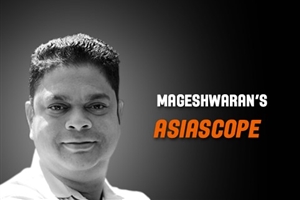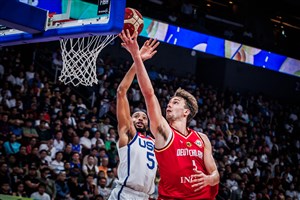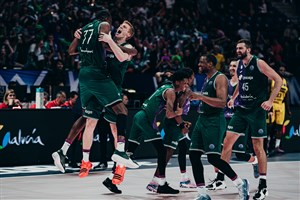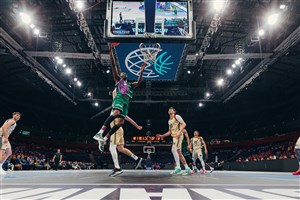
We are the world - A basketball comeback
CHARLOTTE (Steve Goldberg’s Wheel World) - When I walked into the visitor's locker room after an NBA game in Charlotte, I intended to talk with the Chicago Bulls' Luol Deng for an article for FIBA.com, not the column I'm writing now.
Deng, who played for Team GB in London last year, had just helped restore funding for Great Britain's national basketball team, which had suffered the ignominy of having UK Sport tell them that their medal potential didn't warrant a pound or pence on the road to Rio. This message came even though UK Sport announced an 11 percent increase in funding to an all-time high of £347m over the next four years.
Cuts were made along sports lines. In sports featuring both men and women, nothing was done along gender distinctions, even if the medal potential differed greatly. That wouldn’t have passed muster on so many levels.
So what changed, you ask? Why am I opining about this in a wheelchair basketball column? Because when I looked further into the details, while the Olympic hoopsters were cut, the UK Paralympic wheelchair teams were not. For anyone like myself who has worked in or covered Paralympic sports for nearly 20 years, that’s an unusual role reversal.
Personally, I think UK Sport has gone medal mad and are missing the forest for the trees. For all the sporting goodwill wrought by London 2012 as well as the general ideals of traditional British sportsmanship, the leadership of UK Sport had suddenly gone Soviet Bloc in ranking medals and not the effort as their highest priority. Is that truly the end game here?
With their new East German/Chinese mindset of gold, silver and bronze validation, UK Sport gave the ax to badminton, basketball, handball, (Olympic) swimming and (Olympic and Paralympic) indoor volleyball, and wheelchair fencing among others.
If you support UK Sport's future forward medal mania, it makes sense. The GB men's wheelchair team are not only perennial medal contenders but winners with three silver and four bronze in the Paralympics.
For the most part, it's usually the disability sports that have to go cap in hand for support. This time though it was one of the most popular sports in the world. As FIBA says, basketball is everywhere, second only to football in team sports.
Ask any wheelchair basketball player what game they play and the answer will be "basketball". For the Dallas Wheelchair Mavericks and USA teamer, Jay Nelms, it’s even simpler: "ballin".
Any gym rat like Nelms will tell you that it's not an "us and them" when it comes to sitting or standing when you play. Any cut to basketball is a cut to everyone who loves the game.
I know exactly what it's like to be a basketball player in Great Britain; I started playing soccer in the United States in the 1970s. There weren't many of us then. You gravitate to a game because you love it, and it fits you. Some like going against the grain and being non-traditional in their sport of choice. Maybe that's what Deng enjoyed as he played the game in London.
Sudanese by birth, his family fled a continuing civil war there, first to Egypt then England. Educated at St Mary's Roman Catholic High School in Croydon, the 2.06m (6ft 9in) Deng, a Newcastle fan, could have become Peter Crouch but he had been introduced to basketball in Egypt through another Sudanese and ethnic Dinka player, the 2.31m (7ft 7in) Manute Bol, a former NBA player who taught Deng and his older brother the game.
When the family received asylum and emigrated to London, Deng stayed with the game, playing for the Brixton Basketball Club. Like young Americans who go overseas to pursue a football career, he moved to America to test his skills. But his heart holds root where he grew up.
"I'm happy we got the funding; it means a lot to me," Deng told me. "We came a long way. I thought it was stopped for the wrong reason, the funding. You can't just judge it by the Olympics. If you look at the past six years where we came from to bring basketball to where it is, I think it shows a huge improvement through the years. At the Olympics, the record wasn’t great. I thought we played great as a team though."
A professional, Deng is used to dealing with wins and losses, and comebacks. Much like the game itself, it was a team effort that effected the change. Support came from players, fans and politicians as well as FIBA Secretary General and IOC member Patrick Baumann. But every team needs a leader and like a player who takes over a game in the fourth quarter, he led the charge here. He penned a compelling letter to British Prime Minister David Cameron and gave a face to the struggle.
"I think when I wrote the letter and we spoke about it, they went back and saw that there actually was improvement. Six years ago we didn't have a team. Now we have me in the NBA, (Joel) Freeland in the NBA, Pops Mensah-Bonsu who’s been in and out of the NBA. You have young guys in college coming up.”
The reprieve for British Basketball in the Olympics and World Championships is anything but permanent.
As noted in the FIBA.com article on the reversal, "Any reinstated funding will be on a one-year conditional basis, with the following three years' funding released only on the completion of strict performance criteria."
And even stranger things are happening in the Olympic movement where wrestling - one of the few sports that date back some 2,700 years to the original games and still engrained worldwide - is gone after Rio while the custodians of the five rings try to become the X Games.
Nothing is safe from those who miss the point of what the Olympics and Paralympics are really about.
I much prefer winning to losing but I believe that it's the journey rather than the destination that makes both sport and life worthwhile.
While how they compete on the world stage may be affected, the growth of basketball in Great Britain will continue whether UK Sport supports it or not.
Good luck to Deng and GB Basketball on the road ahead. Enjoy the trip.
Steve Goldberg
FIBA
FIBA’s columnists write on a wide range of topics relating to basketball that are of interest to them. The opinions they express are their own and in no way reflect those of FIBA.
FIBA takes no responsibility and gives no guarantees, warranties or representations, implied or otherwise, for the content or accuracy of the content and opinion expressed in the above article.

















